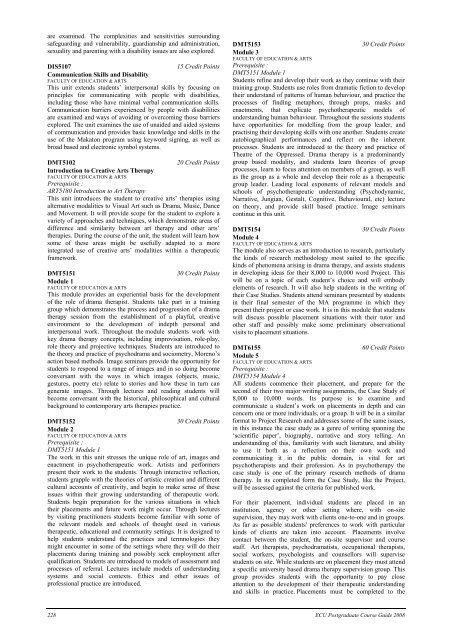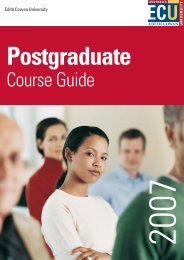Postgraduate - Edith Cowan University
Postgraduate - Edith Cowan University
Postgraduate - Edith Cowan University
Create successful ePaper yourself
Turn your PDF publications into a flip-book with our unique Google optimized e-Paper software.
are examined. The complexities and sensitivities surrounding<br />
safeguarding and vulnerability, guardianship and administration,<br />
sexuality and parenting with a disability issues are also explored.<br />
DIS5107 15 Credit Points<br />
Communication Skills and Disability<br />
FACULTY OF EDUCATION & ARTS<br />
This unit extends students’ interpersonal skills by focusing on<br />
principles for communicating with people with disabilities,<br />
including those who have minimal verbal communication skills.<br />
Communication barriers experienced by people with disabilities<br />
are examined and ways of avoiding or overcoming those barriers<br />
explored. The unit examines the use of unaided and aided systems<br />
of communication and provides basic knowledge and skills in the<br />
use of the Makaton program using keyword signing, as well as<br />
broad based and electronic symbol systems.<br />
DMT5102 20 Credit Points<br />
Introduction to Creative Arts Therapy<br />
FACULTY OF EDUCATION & ARTS<br />
Prerequisite :<br />
ART5180 Introduction to Art Therapy<br />
This unit introduces the student to creative arts’ therapies using<br />
alternative modalities to Visual Art such as Drama, Music, Dance<br />
and Movement. It will provide scope for the student to explore a<br />
variety of approaches and techniques, which demonstrate areas of<br />
difference and similarity between art therapy and other arts’<br />
therapies. During the course of the unit, the student will learn how<br />
some of these areas might be usefully adapted to a more<br />
integrated use of creative arts’ modalities within a therapeutic<br />
framework.<br />
DMT5151 30 Credit Points<br />
Module 1<br />
FACULTY OF EDUCATION & ARTS<br />
This module provides an experiential basis for the development<br />
of the role of drama therapist. Students take part in a training<br />
group which demonstrates the process and progression of a drama<br />
therapy session from the establishment of a playful, creative<br />
environment to the development of indepth personal and<br />
interpersonal work. Throughout the module students work with<br />
key drama therapy concepts, including improvisation, role-play,<br />
role theory and projective techniques. Students are introduced to<br />
the theory and practice of psychodrama and sociometry, Moreno’s<br />
action based methods. Image seminars provide the opportunity for<br />
students to respond to a range of images and in so doing become<br />
conversant with the ways in which images (objects, music,<br />
gestures, poetry etc) relate to stories and how these in turn can<br />
generate images. Through lectures and reading students will<br />
become conversant with the historical, philosophical and cultural<br />
background to contemporary arts therapies practice.<br />
DMT5152 30 Credit Points<br />
Module 2<br />
FACULTY OF EDUCATION & ARTS<br />
Prerequisite :<br />
DMT5151 Module 1<br />
The work in this unit stresses the unique role of art, images and<br />
enactment in psychotherapeutic work. Artists and performers<br />
present their work to the students. Through interactive reflection,<br />
students grapple with the theories of artistic creation and different<br />
cultural accounts of creativity, and begin to make sense of these<br />
issues within their growing understanding of therapeutic work.<br />
Students begin preparation for the various situations in which<br />
their placements and future work might occur. Through lectures<br />
by visiting practitioners students become familiar with some of<br />
the relevant models and schools of thought used in various<br />
therapeutic, educational and community settings. It is designed to<br />
help students understand the practices and termnologies they<br />
might encounter in some of the settings where they will do their<br />
placements during training and possibly seek employment after<br />
qualification. Students are introduced to models of assessment and<br />
processes of referral. Lectures include models of understanding<br />
systems and social contexts. Ethics and other issues of<br />
professional practice are introduced.<br />
DMT5153 30 Credit Points<br />
Module 3<br />
FACULTY OF EDUCATION & ARTS<br />
Prerequisite :<br />
DMT5151 Module 1<br />
Students refine and develop their work as they continue with their<br />
training group. Students use roles from dramatic fiction to develop<br />
their understand of patterns of human behaviour, and practice the<br />
processes of finding metaphors, through props, masks and<br />
enactments, that explicate psychotherapeutic models of<br />
understanding human behaviour. Throughout the sessions students<br />
have opportunities for modelling from the group leader, and<br />
practising their developing skills with one another. Students create<br />
autobiographical performances and reflect on the inherent<br />
processes. Students are introduced to the theory and practice of<br />
Theatre of the Oppressed. Drama therapy is a predominantly<br />
group based modality, and students learn theories of group<br />
processes, learn to focus attention on members of a group, as well<br />
as the group as a whole and develop their role as a therapeutic<br />
group leader. Leading local exponents of relevant models and<br />
schools of psychotherapeutic understanding (Psychodynamic,<br />
Narrative, Jungian, Gestalt, Cognitive, Behavioural, etc) lecture<br />
on theory, and provide skill based practice. Image seminars<br />
continue in this unit.<br />
DMT5154 30 Credit Points<br />
Module 4<br />
FACULTY OF EDUCATION & ARTS<br />
The module also serves as an introduction to research, particularly<br />
the kinds of research methodology most suited to the specific<br />
kinds of phenomena arising in drama therapy, and assists students<br />
in developing ideas for their 8,000 to 10,000 word Project. This<br />
will be on a topic of each student’s choice and will embody<br />
elements of research. It will also help students in the writing of<br />
their Case Studies. Students attend seminars presented by students<br />
in their final semester of the MA programme in which they<br />
present their project or case work. It is in this module that students<br />
will discuss possible placement situations with their tutor and<br />
other staff and possibly make some preliminary observational<br />
visits to placement situations.<br />
DMT6155 60 Credit Points<br />
Module 5<br />
FACULTY OF EDUCATION & ARTS<br />
Prerequisite :<br />
DMT5154 Module 4<br />
All students commence their placement, and prepare for the<br />
second of their two major writing assignments, the Case Study of<br />
8,000 to 10,000 words. Its purpose is to examine and<br />
communicate a student’s work on placements in depth and can<br />
concern one or more individuals, or a group. It will be in a similar<br />
format to Project Research and addresses some of the same issues,<br />
in this instance the case study as a genre of writing spanning the<br />
‘scientific paper’, biography, narrative and story telling. An<br />
understanding of this, familiarity with such literature, and ability<br />
to use it both as a reflection on their own work and<br />
communicating it in the public domain, is vital for art<br />
psychotherapists and their profession. As in psychotherapy the<br />
case study is one of the primary research methods of drama<br />
therapy. In its completed form the Case Study, like the Project,<br />
will be assessed against the criteria for published work.<br />
For their placement, individual students are placed in an<br />
institution, agency or other setting where, with on-site<br />
supervision, they may work with clients one-to-one and in groups.<br />
As far as possible students' preferences to work with particular<br />
kinds of clients are taken into account. Placements involve<br />
contact between the student, the on-site supervisor and course<br />
staff. Art therapists, psychodramatists, occupational therapists,<br />
social workers, psychologists and counsellors will supervise<br />
students on site. While students are on placement they must attend<br />
a specific university based drama therapy supervision group. This<br />
group provides students with the opportunity to pay close<br />
attention to the development of their therapeutic understanding<br />
and skills in practice. Placements must be completed to the<br />
228 ECU <strong>Postgraduate</strong> Course Guide 2008



